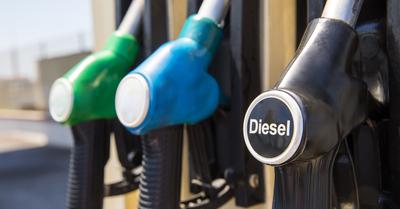If you ever run out of heating oil while off-roading, you might wonder, can you use off road diesel for heating oil?
Off road diesel can be an acceptable substitute for heating oil. Since heating oil and diesel are both midweight petroleum distillations, they can be burned by the same systems and will mostly produce the same amount of heat.
While diesel can be used as a temporary replacement, there are certain things to keep in mind, since using diesel instead of heating oil in the long run can do damage to your furnace.
Experience is the best lesson, but you can learn from the experience of others as well. In this article we’ve collected information from frequent off-roaders about using either one in your heating furnace while you’re on your trip.
This article may contain affiliate links where we earn a commission from qualifying purchases.
Are Diesel and Heating Oil the Same?
While diesel, sometimes called petrodiesel, and heating oil are both, as mentioned earlier, midweight petroleum distillations, there are still a number of differences between them that make them separate from one another.
Heating oil is more of a blanket term to talk about a variety of fuels. Generally, ‘heating oil’ tends to include the kerosene and gas oil fuel types.
Kerosene is used for industrial engines and machines, as well as home heating systems. It used to be extracted from fossil fuels like coal, or wood but nowadays, it is produced as a distillation of crude oil. Kerosene has a flash point – the temperature at which the vapor ignites – within the same range as diesel.
Gas oil is generally heavier, and is used in old boilers or vehicles used in agriculture. It is also a distillation of petroleum, and has a flash point in the same range as diesel, but on the higher side.
However, heating oils usually tend to be a bit heavier than diesel. This results in a higher heat output with less combustion, which makes it good for furnaces.
There are also some significant differences in the price of diesel and heating oil. Even if you buy the same amount of heating oil and diesel, there will be a difference. Diesel is often much more expensive than heating oil, even when it is not being taxed.
While they are both fairly similar fuels, there are some extra costs associated with each one that contribute to the price for the end consumer. For example, diesel is often used in commercial machines, and thus has to pass some very strict sulfur standards by law, which pushes the cost up. Diesel will also frequently have several taxes levied on it that other fuels don’t.
On the other hand, diesel is commonly available at gas stations, and you can simply go and pick it up, whereas heating oil usually comes with delivery costs. On top of that, delivery trucks that bring heating oil are usually smaller than diesel trucks, which means that each truck delivers less fuel than it could otherwise. This again, contributes to the cost of the oil.
Can You Use Diesel as a Replacement for Heating Oil?
Because diesel and heating oil tend to burn similarly, you can use diesel as a replacement for heating oil when it comes to your furnaces. However, just because you have the option doesn’t mean you should start relying on it as a backup.
Diesel is only a good option for use in the short term, and should not become a permanent replacement. Since diesel is lighter weight, more fuel needs to be burnt to produce the same amount of heat.
Additionally, diesel has a flash point that, while around the same range as heating oils, lies on the higher side. This means that diesel burns a bit hotter than heating oil, if you use it for longer periods of time, you can end up doing damage to parts of the furnace and interfere with the functionality.
Additionally, diesel is only a good replacement for heating oil of No.2 grade. This involves the weight of the oil, and most heating furnaces use No.2 grade oil. If your furnace uses any other kind of oil, diesel is probably not going to work as a replacement for you.
Off-road diesel is a red-dyed type of oil that is meant to show that it is available only for off-road fuel uses, such as construction, agriculture or boiler fuel. Most diesel oil has very low sulfur content due to EPA laws. However, heating oil can have varying sulfur levels. While off-road diesel can be used as a substitute, the other way around is not possible.
How to Add Diesel to Your Heating Tank
There is no limit to how much diesel you should use at one time (as long as you’re not making it a permanent solution!). There are some specific ways to go about replacing the oil in your tank.
First, make sure that the diesel oil you get is in a container that is easy to identify. Sometimes heating oils are also red-dyed, which can make it difficult to differentiate between the two, and you don’t want to accidentally use diesel when you have heating oil available.
Before adding any fuel to your tank, make sure you turn the furnace off, and wait for it to cool down. The tank’s fill pipe will be covered with a cap, which you can remove and pour the fuel in.
Depending on the kind of oil you’re switching from, you may also have to clean the tank before pouring the fuel in. This is to make sure any residue and impurities are removed, but most times you don’t have to do this when switching from heating oil to diesel.
After pouring the fuel in, wait for a while so any sediment in the tank that may have gotten stirred up can settle down. Once you think enough time has passed, you can turn the furnace on.
If you don’t wait for the sediment to settle down, dirty and impure fuel will end up going through the pipes and your system could clog up. If this happens, you may have to call in an expert to clean out the entire system for you and clear the fuel lines. To avoid this, it is best to wait for a longer period of time before you turn the furnace on.
After this, you can resume regular use, and your furnace will continue providing heat as it did before.
How Long Does Diesel Last As Heating Oil?
How long fuel lasts you will naturally depend on your fuel usage. If you want more heat, or you want to heat up a larger space, your fuel usage will go up. In general, five to ten gallons of diesel is quite enough to last you around a day or two.
This is enough time to replenish your supply of heating oil so you can switch back. Ideally, since long term diesel usage can harm your furnace, you wouldn’t be using it for a longer time anyway.
Avoid storing diesel for more than six months at a time since it can start to degrade and become a potential danger. If you’re trying to prolong the shelf-life of your diesel, you can use additives, but you’ll still have to use it within the year.
Besides diesel, you can also use kerosene as a replacement for your heating oil – though again, only in the short term. Make sure not to use gasoline, since gasoline is a lightweight oil and can cause some severe operational damage to your furnace even in the shortest period of time.
However, it’s important to remember that while diesel can be used instead of heating oil for a small period of time, this substitution goes only one way. You cannot use heating oil as a replacement for diesel in vehicles or engines, and doing so can be very dangerous.









